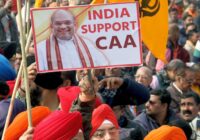India does have a policy on Afghanistan, but its endorsement of peace talks with the Taliban is contentious.
One could be forgiven for entertaining skepticism about India’s policy on Afghanistan. Information that is available in the public sphere tends to veer toward the “general,” conveniently evades the “specific,” and thus invites doubts. Despite Kabul’s enormous strategic importance for India’s national interest, policy pronouncements from New Delhi on Afghanistan flirt more with the “aspirational” rather than the “practical.” The mere existence of India’s policy on Afghanistan remains contested, while its character invites criticism.
Thus, there is considerable merit in exploring whether there is a coherent Afghanistan policy that undergirds the various proclamations from India, and the specific aspects of this policy that summon criticism. Three questions, offered largely as criticisms, deserve particular scrutiny. First, does India have an Afghanistan policy? Second, is India’s Afghanistan policy framed from the prism of New Delhi’s relations with Pakistan? Third, is India’s policy on Afghanistan based on principle or pragmatism?
The Arguable: Does India Have an Afghanistan Policy?
Of course, it does. A resounding answer such as this obliges us to quickly move from the “yes” to the “here’s how.” New Delhi may not articulate its policy in a manner that several governments in the West do. It may not put the policy agenda down on paper and share details for public consumption, as is the norm in several countries. As far its policy pronouncements go, New Delhi may also be criticized for confusing “strategy” for “slogan” and “policy” for “rhetoric.” But judging from its unceasing commitment toward Afghanistan’s economic growth, institutional development and political stability, it is reasonable to assert that India does indeed have a policy for Afghanistan. Two arguments support this assertion.
The first relates to the hazards of operating in Afghanistan. For a country that has been a victim of several terrorist attacks in the country, it would be implausible for India to bear the political costs of sustained engagement without a policy in place. This is, after all, a country whose embassy in Kabul was bombed; consulates in Jalalabad, Kandahar and Herat attacked; infrastructure projects repeatedly blocked; and its nationals, including doctors, engineers and musicians, ruthlessly killed. Yet India continues to brave the dangers with exemplary forbearance, and navigate the uncertainties of the Afghan context to deliver on its commitments. Thus, there is clearly an Afghan policy at work in New Delhi that frames the vision and goals of the engagement, as well as factors in the costs and risks.
The second argument for Indian policy on Afghanistan is economic. For a country that has — depending on which estimates one refers to — almost a third of its population below the poverty line, a third of its population illiterate, and two in every five children malnourished, to commit $2 billion in assistance to another country’s development cannot simply be arbitrary or coincidental.
The Taliban forbid schools and secular education, impede delivery of basic public services in villages, and create a culture of fear and retribution. As a result, Afghan society is deprived of an educated and informed citizenry that can reason and decide what is best for its own progress.
Even when it comes to assessing the coherence of India’s policy, one would find remarkable consistency on most aspects of relations between the two countries. India has historically sought to strengthen ties with the Afghan government and people, while it has also supported Afghanistan’s political evolution and enabled its economic development. One could be tempted to claim that India’s Afghanistan policy took an about-turn in 2001: that it opportunistically shifted its support from the largely non-Pashtun Northern Alliance and instead toward the Pashtun Hamid Karzai in 2002.
But that shift was not indicative of a change in policy, per se; it was merely a change in personalities in Kabul. With the exception of the Taliban regime (1996-2001), New Delhi has enjoyed strong ties with every Afghan government since India’s independence. When the Taliban came to power in 1996, India refused to recognize them as a legitimate government. After the Taliban’s ouster in 2001, India merely resumed its relations with the regime that was catapulted to power. The underlying Afghanistan policy in India, therefore, has remained more or less consistent.
Is India’s Afghan Policy Pakistan-Centric?
The second criticism insinuates that India looks at Afghanistan from the perspective of its relations with Pakistan. Afghanistan is claimed to be a zero-sum game that, if India wins, Pakistan loses — and vice versa. Such allegations are understandable, but they suffer from two problems.
First, it is an oversimplification to characterize India’s Afghanistan policy as Pakistan-centric. India’s engagement in Afghanistan is geared primarily at enabling the country to realize its political and economic potential. The objectives, content and scope of India’s developmental and capacity-building programs in Afghanistan attest to this fact. Drawing from its own experience of negotiating conflicting interests and seemingly irreconcilable stakeholders in a multi-ethnic democracy, India supports programs in Afghanistan that help to not only educate and train Afghans, but also strengthen institutions that would enable consolidation of democratic gains.
India’s Afghanistan policy, therefore, aims at supporting democratic progress and pluralism, and creating conditions that empower Afghans to resist the Taliban. No dimension of this policy is focused exclusively on Pakistan. The policy seeks to complement US and NATO efforts in Afghanistan: to enable the Afghans to confront the totalitarian ideology and violent extremism of the Taliban. This entails making Afghan cities and villages safe from attacks; providing secular education in schools to replace blind emphasis on credulity and authority with an appreciation of healthy skepticism; assisting in capacity-building of Afghan bureaucracy; and promoting livelihoods.
Second, such allegations fail to appreciate the complexities of foreign policy formulation in a real world context. Foreign policy toward a country cannot be framed in isolation with the regional and sub-regional context of the nation. Policies affect, and are affected by, the larger context that punctuates them. Just as any other country, India would integrate its regional and country-specific policies to make sure that efforts toward one complement the other. India’s policy in the region would, therefore, need to integrate the dynamics of its relations with its neighbors. However, it is an oversimplification to suggest that India’s Afghan policy is Pakistan-centric, or vice versa.
So, argue, if you may, and vehemently so, for a disordered Indian policy that has inherited the West’s misguided idealism about peace talks with the Taliban. Argue, also, that India punches below its weight, and that, given its enormous goodwill and the amount of resources it brings to the table, it could accomplish more in Afghanistan. But neither of these criticisms indicate an absence of policy or an approach that is Pakistan-centric. Some criticisms of India’s policy, instead, point to its character — a lack of resolve and political will in New Delhi. It is those matters of resolve and will that this article now turns to.
The Unarguable
The one policy area on Afghanistan where India has had to improvise upon is its perception of the Taliban. India’s initial reluctance to accept the Taliban as part of Afghan politics has gradually evolved into a passive acceptance of their role in a future Afghanistan. After being sidelined by the West on this issue, most notably in the 2010 London conference, India has chosen to back Afghan efforts to explore prospects of ending the war through talks. While doing so, New Delhi has also let its concerns known to Kabul. These concerns are reasonable and are worth mentioning.
New Delhi remains wary that an integration of the Taliban into Afghan politics could be a unidirectional process, where concessions are made only to appease the Taliban. Once the Taliban are brought back, there is nothing that would prevent a wholesale “Talibanization” of Afghan politics. There are simply no institutional safeguards in place to avert this possibility. The social and political gains of the post-2001 Afghanistan risk being compromised.
There is also legitimate concern in New Delhi that integrating the Taliban in Afghan politics would weaken the democratic ethos of contemporary Afghanistan. The peace talks, therefore, are not just only about finding a political “solution” to the conflict. They are also about defining the character of the Afghan state. If the state, by Weberian definition, is a political entity that has exclusive monopoly over the legitimate use of force, then allowing a sinister, draconian and well-armed outfit that prides itself on its anti-civilization to partake in politics is to undermine the foundation of the Afghan state.
Given Pakistan’s longstanding track record in Afghanistan as a spoiler, it is unlikely that Islamabad would act as an honest broker in any talks, unless there is a shift in its strategic calculus.
Despite these concerns, India has publicly endorsed a peace process that would be “Afghan-led.” This is where the contradictions begin to emerge in India’s Afghanistan policy. An “Afghan-led” process may perhaps negotiate an insurgency that is Afghan-led; it cannot negotiate one that is Pakistan-led.
Neither Principle, Nor Pragmatism
The Taliban have relentlessly obstructed Afghanistan’s political development and victimized all segments of Afghan society, with indiscriminate violence and brutality. The “present” is not all that they ruin: They also stamp their authority on the society’s future. The Taliban forbid schools and secular education, impede delivery of basic public services in villages, and create a culture of fear and retribution. As a result, Afghan society is deprived of an educated and informed citizenry that can reason and decide what is best for its own progress. The Taliban also ensure that children grow up in a culture where communal trust is broken down, and the only source of legitimate authority is fear.
Afghans are entitled to ask why India would support talks with the Taliban — a group that remains antithetical to the very idea of progress. Is it not rather revolting to see India endorse talks with a group that undermines, obstructs and impedes the evolution of the “new Afghanistan”? Was it not the Haqqani network, a group closely affiliated with the Taliban, who bombed the Indian Embassy in 2008? And does the Taliban not represent the very worst that any context, anywhere, can offer? What, then, explains India’s decision to lend its support to the peace process?
On matter of principle, it does not flatter India’s credibility to support engagement with a group that seeks to select itself for politics rather than be open to get elected by the people. The Taliban are anti-democracy, anti-pluralism, disdainful of progress, rejecting of reason, and willing to kill their own in pursuit of power. On matter of pragmatism, too, negotiating with a group that has no long-term capacity to enforce commitments is an exercise in extreme self-delusion.
But could the peace process offer more promise if it were led by the Pakistani military? Given Pakistan’s longstanding track record in Afghanistan as a spoiler, it is unlikely that Islamabad would act as an honest broker in any talks, unless there is a shift in its strategic calculus. The internal divisions among the Taliban also douse the prospects of any peace deal being accepted and implemented uniformly at the local level. Ultimately, the Afghan government would find it hard to garner broad support for the peace process, until it institutionalizes a decentralized and representative state structure that delivers services to all Afghans.
Questions for Policymakers
India does have a policy on Afghanistan, but its policy suffers from its compromised stance on the peace talks. Some reasonable questions for those vested with policymaking in Delhi are: What if the peace talks, which India wittingly or unwittingly supports, actually materialize? What if the Taliban return to power in Kabul? Who would India turn to, then?
These are useful questions to ponder over as India recalibrates its regional policy under the new administration led by Narendra Modi. More than questions, these represent inconvenient truths; truths that are pretty widely spelled by now.
The views expressed in this article are the author’s own and do not necessarily reflect Fair Observer’s editorial policy.
Support Fair Observer
We rely on your support for our independence, diversity and quality.
For more than 10 years, Fair Observer has been free, fair and independent. No billionaire owns us, no advertisers control us. We are a reader-supported nonprofit. Unlike many other publications, we keep our content free for readers regardless of where they live or whether they can afford to pay. We have no paywalls and no ads.
In the post-truth era of fake news, echo chambers and filter bubbles, we publish a plurality of perspectives from around the world. Anyone can publish with us, but everyone goes through a rigorous editorial process. So, you get fact-checked, well-reasoned content instead of noise.
We publish 2,500+ voices from 90+ countries. We also conduct education and training programs
on subjects ranging from digital media and journalism to writing and critical thinking. This
doesn’t come cheap. Servers, editors, trainers and web developers cost
money.
Please consider supporting us on a regular basis as a recurring donor or a
sustaining member.
Will you support FO’s journalism?
We rely on your support for our independence, diversity and quality.








Comment